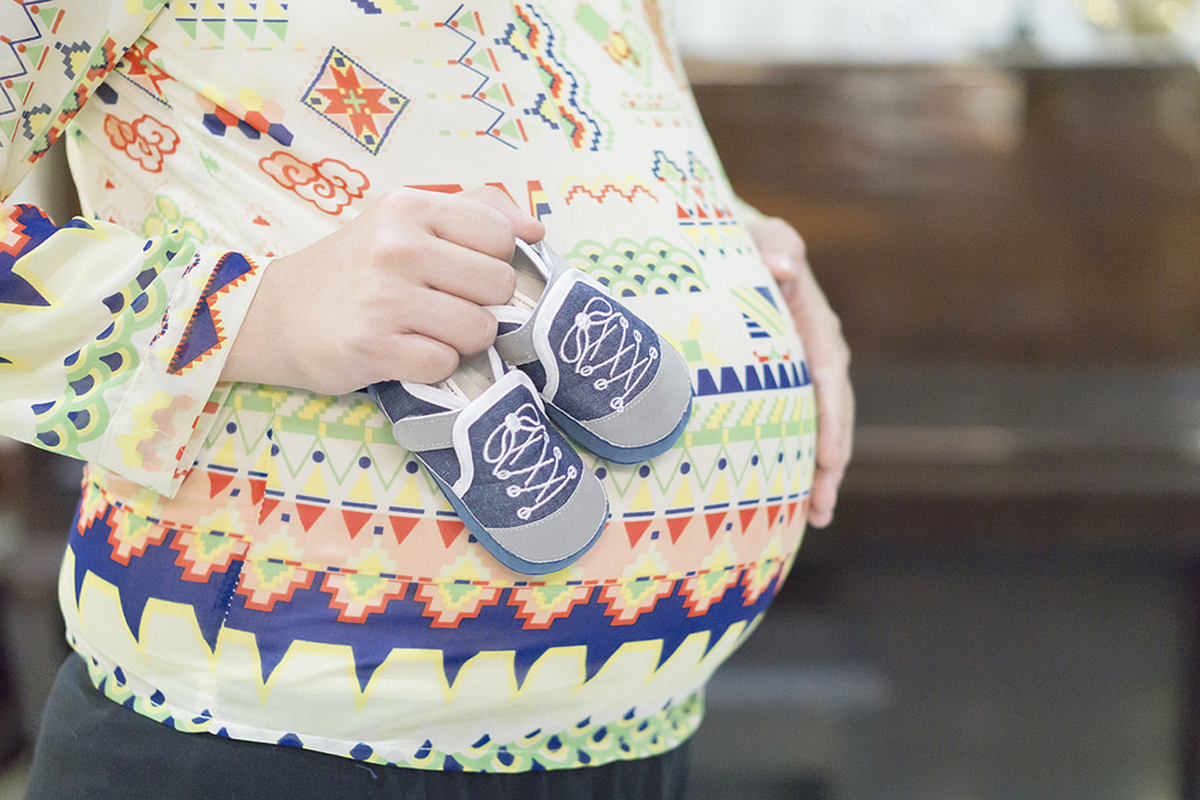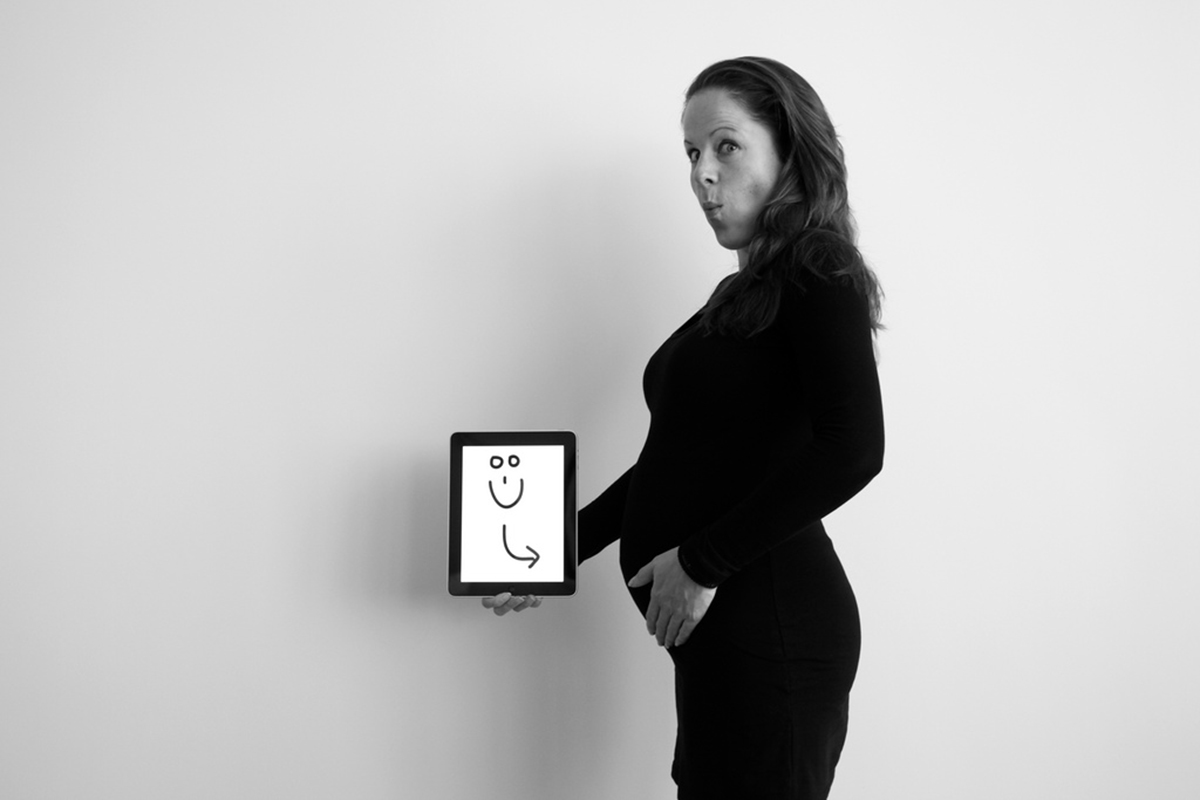Every pregnant woman in history knows she's pregnant when her period goes missing-in-action, she starts throwing up all kinds of beautiful rainbow-vomit first thing every morning, and her breasts are suddenly really tender for no reason. Everyone knows that. Or do they?
Pregnancy symptoms vary for everyone, and they don't necessarily only start when your menstrual period stops.
Many women get unusual symptoms they may not associate with being pregnant, and they start from the time the egg is fertilised (which may be a good couple of weeks before your missed period).
Here, we explore the earliest signs of pregnancy that no-one ever tells you about.

Spotting and Cramping
Just a couple of days after conception, the fertilised egg will attach itself to the wall of your uterus. This may cause some light spotting and some mild cramps that will feel like menstrual cramps. For many women, this is actually the first sign they're pregnant, but many women overlook it, thinking its "mittelschmerz" pain, pain that occurs halfway through the menstrual cycle, or else pain and bleeding at the start of their period.
However, this pain is quite mild and the bleeding very light, so it will probably be lighter than your regular period.
White Milky Discharge
Also immediately following conception, you will start to notice a white milky discharge from your vagina. Many women assume they have thrush, but this is caused by nothing more sinister than the thickening of your vaginal walls. This discharge is designed to prevent infection as your cervix and vaginal walls soften, ready for childbirth.
This discharge will continue throughout pregnancy, but is nothing to worry about. However, if the discharge becomes yellow, green, or develops a foul odour, you must see a doctor immediately, as this may be a sign of bacterial infection.
Feeling Warm
Your basal temperature goes up by about point-three Centigrade when you ovulate; it remains that way until you menstruate. If your temperature stays raised for two weeks or more, it may be a sign you're pregnant.
Breast and Nipple Changes
Not only will your breasts become more swollen and tender, but the areola around the nipple may start to darken. You will probably find that your breasts hurt more early in the pregnancy. As your body adapts to the new hormones, this should improve.
Fatigue
If you suddenly feel very fatigued and start wanting to go to bed early, it could be a sign that you're pregnant. Fatigue sets in as early as one week after conception, caused by a higher level of the hormone progesterone.
If you think your fatigue is related to pregnancy, it's important to rest.
READ Abdominal pain during pregnancy: Causes & Treatments
Dizziness
If the room suddenly seems to be spinning, it could be another early sign that you're pregnant. Dizziness often shows up before your nausea, and may even cause fainting. It can be linked to dilating blood vessels, and low blood sugar, as well as the sudden drop in blood-pressure that pregnant women often have.
However, if you have dizziness, along with vaginal bleeding and severe abdominal pain, get yourself to the Accident and Emergency Department/Emergency Room, as it could be a sign of a potentially-deadly ectopic pregnancy.
More Weird Early Pregnancy Signs
Constipation
Our digestive systems slow when we're pregnant, allowing more time for nutrients to digest. This can lead to constipation. If you're feeling full of wind, but are straining to go, drink plenty of water, eat plenty of vegetables, and ask your local pharmacist for advice about a safe stool-softener.
You Taste Metal
Increases in the female hormones oestrogen and progesterone result in changes to taste for many women. This includes a specific condition called "Dysegusia", where sufferers taste metal. This happens as little as two weeks after conception, and may last for the duration of your pregnancy (although, for many women, it disappears in the second trimester). Try combating this condition by eating minty chewing gum, cold water, or spicy food.

Heartburn
Eight out of ten women experience heartburn in pregnancy. It's more common in the second and third trimesters, caused by a growing womb, pressing on your stomach. However hormone changes can relax the valve between your stomach and the oesophagus, meaning that you have this problem early in your pregnancy.
If you suffer heartburn: avoid fried or spicy food; eat small, frequent meals, and avoid fizzy drinks.
Catching Every Sniffle
Pregnancy lowers your immunity to colds and flu. You may find yourself getting suddenly catching every sniffle if you're pregnant.
If you think you're pregnant, ask your pharmacist about safe options for treating fevers and coughs, and be sure to have the flu vaccine.
Mood Swings
If one minute, your laughing at a comedy, and the next, you're weeping over a charity appeal in the adverts, it's very possible you're pregnant. Pregnancy causes hormonal changes that make us experience mood swings.
Headaches
Headaches start within the first couple of weeks of pregnancy. They are not dangerous, and usually improve or stop completely within the last six months of pregnancy. They are caused by hormones, and it's generally safe for pregnant women to take paracetamol/acetaminophen, but you shouldn't take anything else unless prescribed by a doctor.
If headaches continue, and are accompanied by high blood pressure, oedema (fluid retention), and protein in the urine (often demonstrated by frothy urine) you should see a doctor immediately, as it could be a sign of potentially-dangerous preeclampsia.
The Truth About Missed Periods and Morning Sickness
The two symptoms that everyone "knows" to be definite signs of pregnancy, missed periods and morning sickness, aren't actually as straightforward as you might think.
Bleeding: Many women have no vaginal bleeding throughout their pregnancy. Some women, however, continue to have intermittent vaginal bleeding that appears to be a period (although it isn't). No-one knows what causes this bleeding. Some women have light spotting early in pregnancy. This is not dangerous.
But there are some occasions when you should be concerned about vaginal bleeding. That is: when it is heavy, sudden, or painful. Vaginal bleeding can be a sign of miscarriage, ectopic pregnancy, or another problem that mimics pregnancy (such as Molar Pregnancy, where abnormal tissue grows in the uterus). If you are concerned, always see a doctor.
Nausea: "Morning sickness" is a misnomer, as you can have it any time of the day. Hormones likely cause or contribute to the nausea, vomiting and the inability to stomach certain foods that were previously enjoyed (such as fish). However, it's a myth that every woman experiences this symptom; only 80% of women have Morning Sickness.
READ Early Pregnancy Symptoms and Signs
Nausea and aversions to foods may last for the entire pregnancy, but that's rare (and most common with a severe condition called Hyperemesis Gravidarum, where severe and debilitating nausea, vomiting and food aversion lasts throughout pregnancy). For most women, this symptom goes away by the fourteenth week.
Conclusion
All these symptoms may be a sign of something other than pregnancy, including a harmless virus. But, if any of these symptoms persist for two weeks or more, it might be worth taking a pregnancy test. Who knows, rather than being a sign of a virus, these symptoms could be the beginning of the biggest adventure of your life.
- http://www.babycenter.com/404_can-you-get-your-period-while-youre-pregnant_7102.bc http://www.healthline.com/health/pregnancy/weird-early-symptoms http://www.nhs.uk/conditions/pregnancy-and-baby/pages/morning-sickness-nausea.aspx http://www.nhs.uk/conditions/pregnancy-and-baby/pages/indigestion-heartburn-pregnant.aspx http://www.nhs.uk/conditions/pregnancy-and-baby/pages/flu-jab-vaccine-pregnant.aspx http://www.nhs.uk/conditions/pregnancy-and-baby/pages/headaches-pregnant.aspx http://www.webmd.com/baby/guide/pregnancy-am-i-pregnant http://www.webmd.com/baby/guide/bleeding-during-pregnancy http://www.womens-health-advice.com/pregnancy-symptoms/metallic-taste-in-mouth.html
- Photo courtesy of bayuaditya: www.flickr.com/photos/bayuaditya/15747976465/
- Photo courtesy of thms: www.flickr.com/photos/thms/5271117702/

